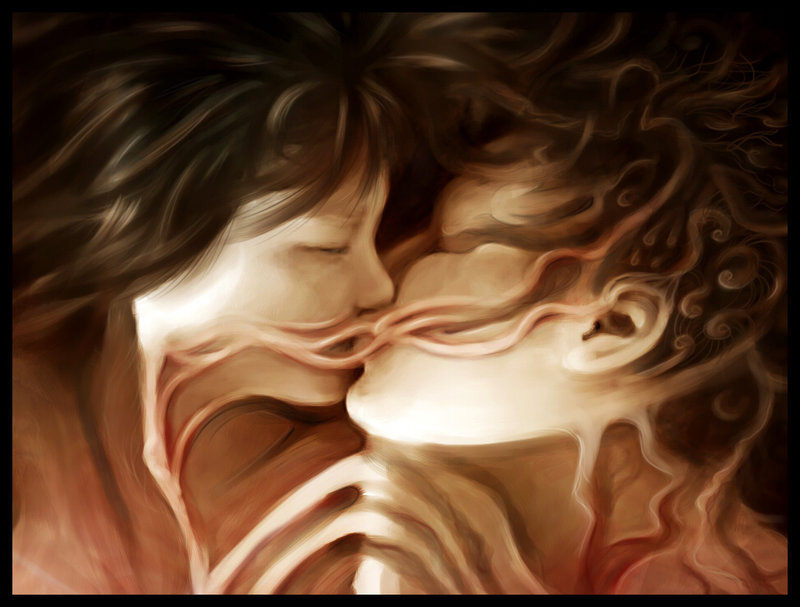A dark, feminist work of creative fiction that exhibits what can happen when an abuse of power snaps someone in half…

by: Niamh Burns ((Header art by Miles Johnson.))
We all want out of here. We blame the infrastructure, even though the thing that’s swallowing us is the combined dissonance of all of our separate disquiets. Paula’s whining about her throat, she’s talking about Whiskey cessation, bodily rights, how we should be allowed to harm ourselves if we want to. Some girl who squeals for attention stares at my face with her mouth drooping. Being here is like sitting inside of a cold sore.
Every morning, like clockwork, Tammy happens by to talk to me about her boyfriend. She doesn’t seem to care that I’m trying to read the newspaper from the day I was admitted. I’ve been here for three weeks now, I read it every morning because I’m looking for something more in the obituary of my father.
Dale Douglas passed away on Sunday October 14, 1993. He was a strong member of his community and will be missed. He is survived by his wife Therese and his daughter Camryn.
This doesn’t feel like enough. It doesn’t feel like an accurate characterization of the man who ruled my life, and destroyed it. Let alone these details that have been tacked on. No one is survived by my mother; she lives in her own time apart from everyone, and she’s been gone years now.
Tammy rattles on about her boyfriend. “Last night he didn’t call me, but that’s probably just because he was out with his friends. Do you think it’s bad that all of his friends are female? Do you think he loves me?” She asks me this as though I should know the answers. She pounds these questions into me, her voice like a child’s fists because the people who are supposed to be doing therapeutic work with her, with all of us, treat us like inconveniences to expunge as quickly as possible. We are problems to be solved. It’s up to us to treat each other like people, after all we are in this together. “Do you think that if I asked him about these girls he would be mad?” She chews her nails while she says this.
Tammy’s boyfriend is someone I’ve never met, someone I’m happy to never meet. He steals car parts and rearranges them to try and detail his own new cars. He thinks he’ll make the big bucks one day doing this, and in between breaking into junk yards and car lots he photographs women for magazines. That’s what he says at least, when he sends Tammy the proofs and says things like “I wish your tits looked like these, these ones are hot.” Tammy cries about this even though she shouldn’t. If I were her I would have tossed him off a long time ago.
In the hospital we don’t have to be in contact with anything or anyone. We’re allowed to be selfish and trapped. We’re allowed to ignore the windows and pretend the news doesn’t exist, allowing it to just depress the rest of the world. We can ignore the phone and claim headaches, stomach aches, anxiety attacks. People accept these excuses unwittingly because we are “The Ill.” People are inclined to take care of us, to baby us, to downgrade us from human to emotionally needy mule. I mutter small mhmms and gasps in the right areas and that elicits Tammy to call me her best friend. No one ever called me that before. I spent too much time with my dad to be best friends with anyone.
My dad maintained the perfect mixture of helpless neediness and unadulterated “manliness.” He was strong enough to not need your help but he was entitled to have you give it up anyways. And, in his mind, he shouldn’t have to ask. I had to cut his grapefruit for him, trim his hair, tell him that he was doing amazing. This covert emotional incest was caused by my mother disappearing. He urged her to pepper him with decencies no one is owed.
He demanded grace for throwing out a paper plate at a barbecue, insisted he was the greatest man in the world because he made a decent living, maintained that he was always first in line at the great dad awards when he happened to pay attention to something I said. Every little thing was up for gratuity. There aren’t very many things to righteously compliment my dad for. He only goes so far in the direction of good until you realize you’ve hit a backroad and you’re nearly in the volcanic under current of vehement badness.
My childhood was spent fixated on bolstering his ego and bowing to his godliness without given a chance to question why. At twenty-six years old I had received my first promotion at work and I could hardly be there for him anymore. That’s when the questions started to bubble up from under my desk as I spent late nights at the office when I didn’t need to. I started to hear the wastebasket talking and a part of my skull whisper without a mouth. My dad’s face came clear into my mind, the hysterics of my realization were transmuted through the phone when I was told he was dying.
Cancer in four parts in his body — the spleen, the lungs, the eye, the throat.
You’re his executor. He needs you to deal with loose ends, the voice told me.
I laughed into the phone, the nurse was silent on the other end. I could hear my dad somewhere though he probably wasn’t talking in any hearable vicinity. I always knew you’d be a crazy bitch like your mom.
I’d avoided my father for two years. I answered his calls to tell him he was doing great when he achieved a simple task or made a small accomplishment, like basting chicken the right way. I gave him recipes and told him that he was wonderful when he asked. I did my due diligence all the while loving him less every time the phone rang.
When the nurse told me that my father was dying, my heart skipped a beat. The memories flooded back to me under this urgency to be unkind. The sour little girl gazing up at a man who was too distracted by his own nose to see her. The only time he looked into other people’s eyes was to get a picture of what his reflection looked like in them. To ask them if his tie was straight. If he was handsome. If his speech was good. If he was doing alright.
I realized that in that man too there was a scared little boy, but I didn’t care anymore. I spent years loving him, years of catering to his meal plan and dividing my time so precisely that I wouldn’t miss a moment where he needed me, in the drunken hours at night when he had to tell someone how unbelievable it was that he was single. How he cried on my shoulder and sucked dry from me any sense of compassion I had for this kind of human slobbery. Now the nurse muttered something about cardiac arrest, defibrillation, and brain death. She asked if I was okay. I laughed and laughed.
People have a tendency to disbelieve the tearful. When death came to swallow my father, I was the only one there. He had long ago chased away everyone else with his incessant need to be a raging dick. He was starving himself purposefully toward the last leg of his life because the treatment hurt him so much, and he knew it wouldn’t respond to starvation, or maybe his demanding body was altogether too tired to demand anything more. Maybe he never learned to take care of himself.
For a moment walking into that room, I felt an urgency to go back in time and protect him. His body was infantile on the hospital bed, all scabbed and lifeless. I was angry at myself for not spoon feeding him a few more months of life. I was angry at him for not nurturing me enough to give him something to hold onto. The nurse gave me a clipboard to sign. She told me that I had to sign the papers to release him to whatever place it is people go off to. She left the room to let me say what I imagine she presumed would be a tearful goodbye.
Watching the nurse pull that plug would be the closest I’d felt to freedom since the fourth grade when my dad went on a business trip and my mom was still around. The house was quiet, I discovered that I loved to paint. I discovered my mom and I got along really well. I discovered a lot of the hidden counterparts to me that rested under his hunger.
Some people are so hungry they starve everyone around them with their need, but I imagined the nurse’s execution of my freedom wouldn’t be satisfying enough for me.
I squeezed his hand and I thought he pulsed back, The room stuttered and when I came to, I was here, listening to Tammy rattle on about her boyfriend. Listening to Paula go on and on about how not being allowed booze in the psych ward was a political problem, and I didn’t know what to say to any of them. I don’t know what my father would have said, and it seemed his voice was stuck swallowing mine whole. I couldn’t think a single thought that felt like my own. I told Tammy, “You need to take your power back from him. He’s a sick merciless dog. Take it all back.”
When I lifted the pillow from my dad’s face I watched the life roll out of his eyes as the room took on a spatial shift. The nurse came in shortly after, expecting my goodbye was over, expecting the flatline alarm of death ringing through our ears meant my dad had gone naturally, quietly. Clearly she didn’t know him well. She comforted my freedom, as though the shaking in my arms was something other than adrenaline. The next thing, I was being locked in here because I told them that I felt my father in me, that as the life was sucked out of him it transferred to me. That he would never get out of my bones. I was angry, I screamed and I fought. What kind of curse, to have my father’s body trapped in mine?
Niamh Burns is a queer, non-binary fiction writer, poet and philosophy student from the West Coast of Canada.






Ow! Ow ow owwww! Oww! That really hurts. That’s really good writing. OoWW! I’ve known people like that.